#Employees News
Explore tagged Tumblr posts
Text
0 notes
Text
स्वतंत्रता दिवस पर कर्मचारियों को डीए को आस, जानें खजाने पर कितना पड़ेगा असर
Himachal News: स्वतंत्रता दिवस के अवसर पर हिमाचल प्रदेश के कर्मचारियों ने महंगाई भत्ते और छठे पंजाब वेतन आयोग के एरियर की ��ांग उठाई है। कर्मचारी न केवल 12 प्रतिशत देय महंगाई भत्ते में से 4 प्रतिशत के भुगतान की मांग कर रहे हैं, बल्कि संशोधित वेतनमान के एरियर के भुगतान की भी मांग कर रहे हैं। हिमाचल प्रदेश सचिवालय सेवाएं कर्मचारी संगठन के पदाधिकारी इस मांग को लेकर पिछले दिनों मुख्य सचिव से भी मिल…
0 notes
Text
I don't think I'm meant to be employed. It really cuts into my goofy silly haha time. and it makes it nearly impossible to have any wow life is beautiful let me take it in time.
#guess what our employee appreciation gift was. a chair. 100+ dollars on a camping chair for each HQ employee? why not just...#i was just like gee. glad u appreciate me. u ever heard of how companies can shower u with free swag but it doesnt distract from the#horrible culture???#like yes dont give us that 100 dollars but give me an ugly chair with our company logo that i had to lug up a hill.#im just tired of this aspect of HR i think. need me some new scenery
40K notes
·
View notes
Text
17 year old, CEO Tim Drake canceling a press conference and then putting out a statement like, “Sorry for canceling last min, Alfred said that he was going to run my laptop through the dishwasher if I didn’t clean my room. I think he’d do it :/. Also, wasn’t really in the mood. Cya -Tim.”
#I love teen ceo Tim drake so much and he’s not even canon#there are a lot of angsty fics and I love them but I think there’s such a potential for comedy#WE employees gain thousands of followers just live-tweeting the insane shit he does every day#‘CEO probs not putting out statement about new tech bc I just watched his brother pull him kicking and screaming out of the building’#‘found my ceo sleeping in the elevator again’#‘head of R&D just asked me decipher an email at the CEO sent to him. it reads like gen z word salad’#‘Tim Drake is a wonderful boss. he did just ask me if I wanna see him ollie. it was pretty sick’#Tim drake#ceo tim drake#alfred pennyworth
4K notes
·
View notes
Text
In the past, people in the Animal Crossing community would make fun of Tom Nook as a sleazy landlord. Since then, he's really rehabilitated his image as this 'heart of gold' businessman (he's the one who puts bells and furniture in trees for you to find! he adopted orphans! he donates to charity!), but New Horizons genuinely paints the most devious version of him.
He's successfully privatized settler colonialism: you pay HIM to move to a "deserted island" (which apparently the oceans in the AC world are just full of) and start a colony that he is directly invested in. At best he's running a weird vacation package scam (you arrive on the island with no money and in debt for "using his services"). At worst, he's using you to set up company towns. For god's sake, he literally has his own fake currency that he forces you to use to pay off your debt. But don't worry, he's repackaged it in a way that definitely doesn't sound like an MLM scam: the Nook Mileage Program!
You're no longer just his tenant or his temporary part-timer, you're his business lackey. The entire tutorial section of the game has you spending actual weeks running around completing tasks and doing hard labor to set up his colony. You're even tasked with preparing his properties and finding buyers for them. No, you aren't a tenant anymore. You work for the landlord. You are directly responsible for finding tenants for him. And he doesn't even fucking pay you. Not for setting up town hall and museum, or his nephew's shop –– which is the ONLY store on the entire island that sells necessities –– or bringing KK Slider to town, or helping populate his town. Not a single cent. No, actually, you have to pay HIM to BUY infrastructure like bridges and stairs and park benches. And all the while, he's telling you're the "resident representative"; you get to call the shots! That the reward is the community's progress. That what you're doing is in everyone's best interest (but most importantly, his).
Since NH's release, people have done a lot of legwork to say that Tom Nook isn't a capitalist while the game shows him at his very worst. He owns the only general store in town. You're forced to use a phone that he modified and branded as his own. Buy Nook-branded furniture and merchandise at the self-serve kiosk in the town hall, a governmental building! There's no conflict of interest here!
But hey, if you're tired of being the landlord/business mogul's goon, you can also find work as a deluxe resort home designer for a company that also pays you in their special company currency that can only be used to buy their products instead of a real salary! Because that's what the Animal Crossing franchise needs! More vacation homes!!!
#this is a really long winded way to say i really really really really hate new horizon's storyline and player role#i really hate that not only your house but the entire TOWN. the whole COMMUNITY you're a part of is owed to tom nook's business#i really hate the “vacation getaway package” angle because it shows just how commercialized the entire premise of nh is#and how lost the game is in its original core concept#animal crossing is about the experience of moving to a new town and becoming a part of that community#just to compare: all past ac games have a similar opening#you're on a bus or train or taxi to someplace new. a stranger strikes up a conversation and you get to know them before arriving#new horizons opens with you at customer service desk filling out an client application before a flight.#in prev games working for nook in the tutorial is meant to be demeaning. you want it to be over with so you can actually start living life#but in new horizons working for tom nook IS your life. and it's so rewarding! don't you feel rewarded?#you aren't a person. you aren't a new neighbor. you're tom nook's client. and then his unpaid employee. and the game insists it's fun to be#that's how void the game is#because it's bad enough that a rpg life sim got turned into a sandbox game where you have to build the town yourself#but the only reason why you're building it is because the landlord who you're in debt to TOLD you to build it.#everything is a rewards program! everything is a tour service! be sure to do your daily tasks to earn nook bucks to spend on nook merch!#that really sucks imo.#i mean. the entire game is based around the vacationing industry. of course it all feels fake and temporary. it's only a vacation.#long post#rant#not art#god the fact that your starter villagers can't even decide where to live you have to decide for them#i've never played a game that does the opposite of handholding#where instead it's the PLAYER who has to handhold the npcs through everything. and newsflash!! it's really exhausting and boring
3K notes
·
View notes
Text
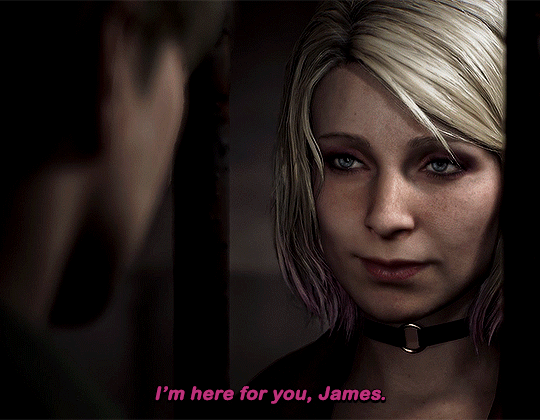



If you happen to make up your mind... I'll be waiting. SILENT HILL 2 (2024) developed by Bloober Team
#silent hill 2#silent hill 2 remake#sh2redit#gamingedit#silenthilledit#userkarlo#userbamf#miyku#mikaeled#horroredit#dailygaming#dailyvideogames#silent hill#james sunderland#silent hill maria#creations tag#gifs#i just finished the game I GET IT NOW..........#this game is my new personality#and james and maria have been promoted to my elite employees
2K notes
·
View notes
Text
nypd chief: his writings show “suspect does seem to have some ill-will toward corporate america.”
#lmao???#that’s like most of america#I want that manifesto plastered everywhere#a collective boo to that mcdonalds employee who ratted him out#also the fact that this story is getting mkre coverage than uhc ever provided...#uhc#the claims adjuster#luigi mangione#us politics#uhc shooter#brian thompson#news#class warfare#capitalism
524 notes
·
View notes
Text

Co-workers.
#bungou stray dogs#bsd#dazai osamu#kunikida doppo#kunikidazai#POV you're Fukuzawa calling your employees to your office#New text from Mori: now you see the shit I had to deal with?#fanart#digital art
2K notes
·
View notes
Text
“'We want the bureaucrats to be traumatically affected,' Russell Vought [co-author of Project 2025], who has been tapped by Mr. Trump to lead the Office of Management and Budget, has said. 'When they wake up in the morning, we want them to not want to go to work because they are increasingly viewed as the villains.'”

If we want federal civil servants not to just abandon their jobs under the pressure of a hostile Trump administration, they will need support from the public. In this essay by Stacey Young, a lawyer in the DOJ civil rights division, explains the help that is needed. This is a gift 🎁 link, so there is no paywall. Below are some excerpts.
Federal employees like me have been hearing a lot in recent weeks about how important it is for us to stay in our jobs, despite President-elect Donald Trump’s open animosity toward much of the federal work force. We’ve been told by friends, relatives and good-government advocates that a well-functioning government — and the survival of our democracy — depends on it. We know. We understand what will happen if Mr. Trump fills the civil service with unqualified, inexperienced people selected for their political loyalty. But to stay in our jobs, we will need more than exhortation; we will need legal, psychological and other practical support. One reason many federal employees are thinking of leaving government — often after decades of serving our country, under Republican and Democratic presidents — is that we’re afraid. The incoming leaders of the government have told us in aggressive terms that they want us either gone or miserable. [...]
What sorts of practical support would help? For one thing, lawyers and mental health providers could offer pro bono or significantly discounted services to federal employees.... Data-removal companies that specialize in taking down personal information online could offer free or discounted plans to federal employees who are being harassed or at risk of harassment. Friends and family members of federal employees with young children or other caregiving responsibilities could offer to pitch in. (Without their help, employees who are stripped of their ability to do some remote work or forced to adhere to overly rigid work schedules may have no choice but to leave their jobs.) Concerned citizens could urge their elected representatives to promote legislation that protects civil servants and oppose draconian bills that would harm them. Those with money to spare could donate to organizations that work to protect public servants. And if you value the civil service, don’t just tell us; tell your friends, neighbors, co-workers and family members too — especially whenever the pernicious “deep state” narrative rears its ugly head.
#civil service#donald trump#support federal civil servants#federal employees#stacey young#the new york times#gift link
368 notes
·
View notes
Text
Being an NPC in Dredge must be a wild ride. You work on an oil rig and one day this guy in a bizarrely tricked out fishing boat rolls up at Mach Fuck You to say hi (why does he have an icebreaker?) and he's got dredging equipment so the foreman asks if he can pull up some of your missing supply shipments and he says sure. Okay, the weird guy with the suspiciously souped up fishing boat (why does one of his engines look like it's made of meat?) is just a nice, normal guy who's just weird about his boat, fine.
And then you start drilling and cause an oil seep in an inhabited group of islands and you feel bad, but your new friend makes a deal with the scientist to go study the seep, so it'll probably be fine, right? Well, then the fisherman, upon hearing that he'll be going back and forth between the oil rig and the Marrows (and isn't that a kind of morbid name for a place where people live?) a lot, dumps a glowing golden anchor overboard that OPENS UP A PORTAL, AND WHEN HE GOES IN THE PORTAL HIS BOAT FUCKING EXPLODES.
And then the next day, his suspiciously souped up fishing boat un-explodes out of the portal and he docks on your workplace that you also live in like nothing ever happened.
I, for one, would simply start drinking.
#dredge#I'm using the same save i already finished the main game on to do the dlcs and i must seem very strange to the oil rig employees#congratulations mr foreman your new friend is a fucking warlock
537 notes
·
View notes
Text
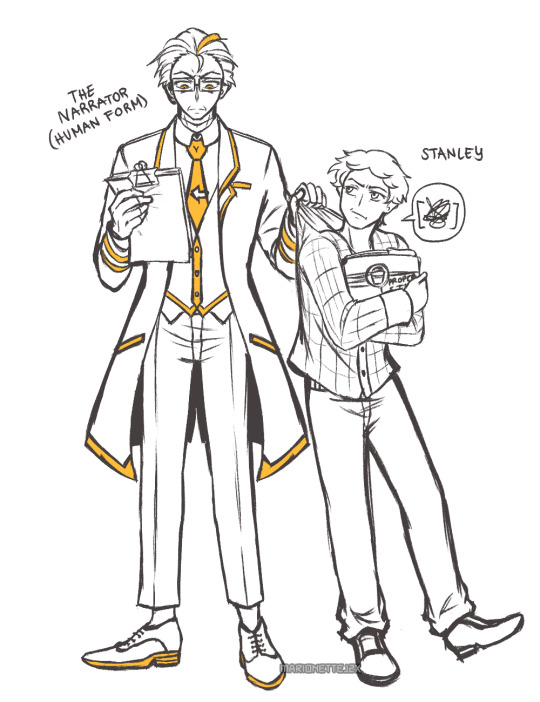





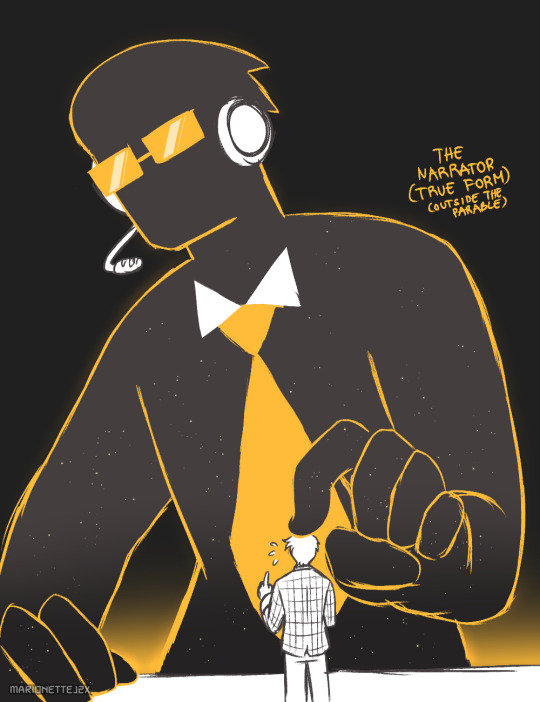
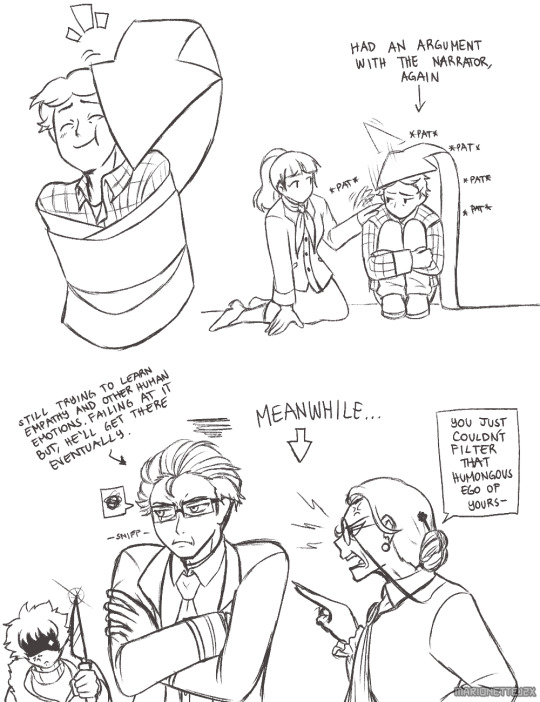
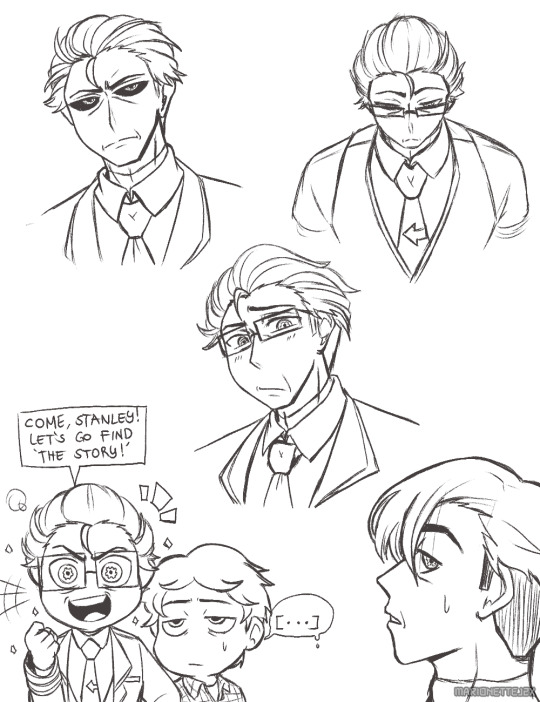
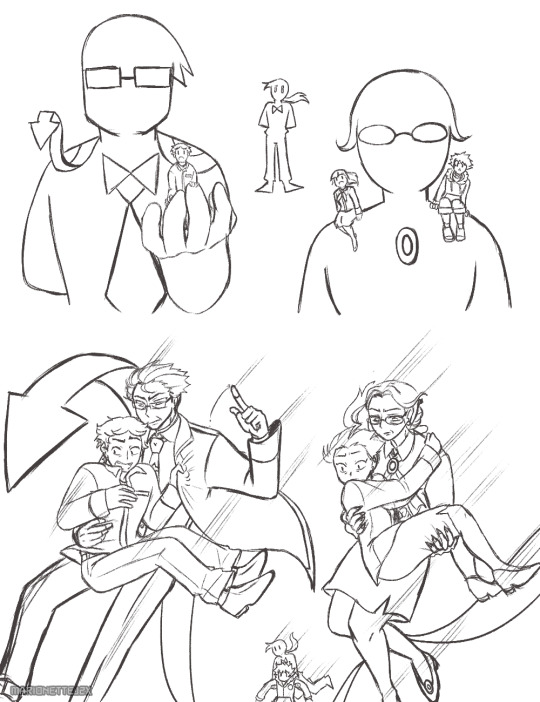
The Stanley Parable: New Script AU
"Something had shifted in the system. Something had changed. The Narrator's struggling to maintain normalcy in his perfectly crafted story as wayward codes, random protocols, glitches and unknown entities started appearing in the parable. Now with his protagonist, Stanley and their newly acquired friends acquaintances, they try their best to comprehend the danger now the parable poses and figure out who the mastermind behind all of it."
^This is actually just a short summary of this AU. I just can't seem to verbalize everything about this since I cannot English enough the things that's brewing on my mind. I had this AU simmering in my mind since last December after discovering this game, (Yes, I know I'm a few years too late for this fandom-).
I might draw more stuff in this AU soon. Maybe a comic sometimes idk but I do have some ideas. (I still have to finish my other comics for the different fandoms I'm in tho.)
(You can comment on the post below if you wanted to ask details about this AU. Please be kind tho especially to each other!)
(also forgive me for misspelling the Curator's name ahahdgdhhd I was not aware. I was really tired skskskks-)
#tsp#the stanley parable#tsp stanley#tsp narrator#tsp curator#tsp bucket#tsp timekeeper#tsp employee 432#tsp employee 427#tsp adventure line#adventure line™#tsp mariella#tsp new script au#the stanley parable: new script au#stanarrator#stannarrator#stanley x narrator#curator x mariella#<- just in case since this au is really slow burn so there might not be any developing relationships yet. maybe some hints for now#also i ruined the curator's name while drawing dkfjfhfh sorry for the misspellings hahsvdhdh#the stanley parable 2#tsp ultra deluxe#tsp ud#the stanley parable: ultra deluxe#here i go again with my aus jdbfhf#ang dami na nyan day huminahon ka oy XD
1K notes
·
View notes
Text
patience being tested. being forced by a bizarre unfortunate situation to adhere to university requirement technicality by taking this simple basic elementary "introduction to environmental history" class.
this class is from facilitators/program which do, like, "history of the American frontier" or "history of fishing and hunting" and still basically subscribe to that old-school twentieth-century idealization and celebration of characters like Teddy Roosevelt and reverence for a mythical arc-of-history-bent-towards-justice narrative of the often-clumsy but ultimately-benevolent US federal government and its mission to "save nature" through the miracle of "sustained yield," while heroic federal land management agencies and "heritage" institutions lead to way, staffed by exceptional individuals (appeals to nostalgia for the frontier and an imagined landscape of the American West; ego-stroking appeals to flattering self-image that center the environmentalist or academic). where they invoke, y'know, ideas like "ecology is important because don't you enjoy cross-country skiing in The Woods with your niece and nephew? don't you like hunting and fishing?" which makes it feel like a time capsule of appeals and discourses from the 1970s. and it invokes concept of "untouched wilderness" (while eliding scale of historical Indigenous environmental relationships and current ongoing colonial violence/extractivism). but just ever-so-slightly updated with a little bit of chic twenty-first-century flair like a superficial land acknowledgement or a reference to "labor histories" or "history from below," which is extra aggravating when the old ideologies/institutions are still in power but they're muddying the water and diluting the language/frameworks (it's been strange, watching words like "multispecies" and "Anthropocene" over the years slowly but surely show-up on the posters, fliers, course descriptions, by now even appearing adjacent to the agri-business and resource extraction feeder programs, like a recuperation or appropriation.) even from a humanities angle, it's still, they're talking at me like "You probably didn't know this, but environmental history is actually pretty entangled with political and social events. In fact, we can synthesize sources and glean environmental info from wacky places like workers' rolls in factories, ship's logs, and poetry from the era." and i'm nodding like YEP.
the first homework assignment is respond to this: "Define and describe 'the Anthropocene'. Do you think 'the Anthropocene' is a useful concept? Why or why not?" Respond in 300 words.
so for fun, right now in class, going to see how fast i can pull up discussion of Anthropocene-as-concept solely from my old posts on this microblogging site.
---
ok, found some
---
I think that the danger in any universal narrative or epoch or principle is exactly that it can itself become a colonizing force. [...] I’m suspicious of the Anthropocene as concept for the very reason that it subsumes so many peoples, nations, histories, geographies, political orders. For that reason, I think ideas like the Anthropocene can be a useful short-hand for a cluster of tangible things going on with the Earth at the moment, but we have to be very careful about how fluid and dynamic ideas become concretized into hegemonic principles in the hands of researchers, policymakers, and politicians. There’s so much diversity in histories and experiences and environmental realities even between relatively linked geographies here in Canada [...]. Imagine what happens when we try to do that on a global scale - and a lot of euro-western Anthropocene, climate change and resilience research risks doing that - eliding local specificities and appropriating knowledge to serve a broader euro-western narrative without attending to the inherent colonial and imperial realities of science and policy processes, or even attending to the ways that colonial capitalist expansion has created these environmental crises to begin with. While we, as a collective humanity, are struggling with the realities of the Anthropocene, it is dangerous to erase the specific histories, power-relations, political orders that created the crisis to begin with. So, I’m glad that a robust critique of the Anthropocene as a concept is emerging.
Text by: Words of Zoe Todd, as interviewed and transcribed by Caroline Picard. “The Future is Elastic (But it Depends): An Interview with Zoe Todd.” 23 August 2016.
---
---
---
The Great Acceleration is the latest in a series of human-driven planetary changes that constitute what a rising chorus of scientists, social scientists, and humanists have labeled the Anthropocene - a new Age of Humans. [...] But what the Anthropocene label masks, and what the litany of graphs documenting the Great Acceleration hide, is a history of racial oppression and violence, along with wealth inequality, that has built and sustained engines of economic growth and consumption over the last four centuries. [...] The plantation, Sidney Mintz long ago observed, was a “synthesis of field and factory,” an agro-industrial system of enterprise [...]. Plantation legacies, along with accompanying strategies of survival and resistance, dwell in the racialized geographies of the United States’ and Brazil’s prison systems. They surface in the inequitable toxic burdens experienced by impoverished communities of color in places like Cancer Alley, an industrial corridor of petrochemical plants running along the Mississippi River from New Orleans to Baton Rouge, where cotton was once king. And they appear in patterns of foreign direct investment and debt servitude that structure many land deals in the Caribbean, Brazil, and sub-Saharan Africa [...]. [C]limatologists and global change scientists from the University of London, propose instead 1610 as a date for the golden spike of the Anthropocene. The date marked a detectable global dip in carbon dioxide concentrations, precipitated, they argue, by the death of nearly 50 million indigenous human inhabitants [...]. The degradation of soils in the tobacco and cotton-growing regions in the American South, or in the sugarcane growing fields of many Caribbean islands, for example, was a consequence of an economic and social system that inflicted violence upon the land and the people enslaved to work it. Such violent histories are not so readily evident in genealogies that date the Anthropocene’s emergence to the Neolithic Revolution 12,000 years ago, the onset of Europe’s industrial revolution circa 1800, or the Trinity nuclear test of 1945. Sugarcane plantations were already prevalent throughout the Mediterranean basin during the late middle ages. But it was during the early modern era, and specifically in the Caribbean, where the intersection of emerging proto-capitalist economic models based on migratory forced labor (first indentured servitude, and later slavery), intensive land usage, globalized commerce, and colonial regimes sustained on the basis of relentless racialized violence, gave rise to the transformative models of plantations that reshaped the lives and livelihoods of human and non-human beings on a planetary scale. [...] We might, following the lead of science studies scholar Donna Haraway and anthropologist Anna Tsing, more aptly designate this era the Plantationocene. [...] It is also an invitation to see, in the words of geographer Laura Pulido, “the Anthropocene as a racial process,” one that has and will continue to produce “racially uneven vulnerability and death." [...] And how have such material transformations sustained global flows of knowledge and capital that continue to reproduce the plantation in enduring ways?
Text by: Sophie Sapp Moore, Monique Allewaert, Pablo F. Gomez, and Gregg Mitman. "Plantation Legacies." Edge Effects. 22 January 2019. Updated 15 May 2021. [Bold emphasis added by me.]
---
---
---
Geologists and other scientists will fight over [the definition of the beginning start-date of the Anthropocene] in scientific language, seeking traces of carbon dioxide that index the worst offenses of European empire which rent and violated the flesh, bodies, and governance structures of Indigenous and other sovereign peoples in the name of gold, lumber, trade, land, and power. [...] The stories we tell about the origins of the Anthropocene implicate how we understand the relations we have with our surrounds. In other words, the naming of the Anthropocene epoch and its start date have implications not just for how we understand the world, but this understanding will have material consequences, consequences that affect body and land.
Text by: Heather Davis and Zoe Todd. On the Importance of a Date, or Decolonizing the Anthropocene. ACME An International Journal for Critical Geographies. December 2017. [Bold emphasis added by me.]
---
---
---
From Aime and Suzanne Cesaire, C. L. R. James, Claudia Jones, Eduoard Glissant, through Sylvia Wynter, Christina Sharpe, and so many others, critical anticolonial and race theory has been written from the specific histories that marked the Black Atlantic. [...] Glissant also reminds us, secondly, of how cunning the absorptive powers of [...] liberal capitalism are - how quickly specific relations are remade as relations-erasing universal abstractions. [...] This absorptive, relations-erasing universalism is especially apparent in some contemporary discourses of […] liberalism and climate collapse - what some call the Anthropocene - especially those that anchor the crisis in a general Human calamity which, as Sylvia Wynter has noted, is merely the name of an overdetermined and specific [White] European man. […] [T]he condition of creating this new common European world was the destruction of a multitude of existing black and brown worlds. The tsunami of colonialism was not seen as affecting humanity, but [...] these specific people. They were specific - what happened to them may have been necessary, regrettable, intentional, accidental - but it is always them. It is only when these ancestral histories became present for some, for those who had long benefitted from the dispossession [...], that suddenly the problem is all of us, as human catastrophe.
Text by: Elizabeth Povinelli. “The Ancestral Present of Oceanic Illusions: Connected and Differentiated in Late Toxic Liberalism.” e-flux Journal Issue #112. October 2020.
---
The narrative arc [of White "liberal humanism"] [...] is often told as a kind of European coming-of-age story. […] The Anthropocene discourse follows the same coming-of-age [...] script, searching for a material origin story that would explain the newly identified trajectory of the Anthropos […]. Sylvia Wynter, W.E.B. DuBois, and Achille Mbembe all showed how that genealogy of [White subjecthood] was [...] articulated through sixteenth- through nineteenth-century [historiographies and discourses] in the context of colonialism, [...] as well as forming the material praxis of their rearrangement (through mining, ecological rearrangements and extractions, and forms of geologic displacements such as plantations, dams, fertilizers, crops, and introduction of “alien” animals). […] As Wynter (2000) commented, “The degradation of concrete humans, that was/is the price of empire, of the kind of [Eurocentric epistemology] that underlies it” (154).
Text by: Kathryn Yusoff. “The Inhumanities.” Annals of the American Association of Geographers, Volume 11, Issue 3. November 2020.
---
---
---
As Yarimar Bonilla suggests in regard to post-Irma-and-Maria Puerto Rico, “vulnerability is not simply a product of natural conditions; it is a political state and a colonial condition.” Many in the Caribbean therefore speak about the coloniality of disaster, and the unnaturalness of these “natural” disasters [...]. Others describe this temporality by shifting [...] toward an idea of the Plantationocene [...]. As Moore and her colleagues write, “Plantation worlds, both past and present, offer a powerful reminder that environmental problems cannot be decoupled from histories of colonialism, capitalism, and racism that have made some human beings more vulnerable [...].” [W]e see that contemporary uneven socioecologies associated with the rise of the industrial world ["the Anthropocene"] are based [...] also on the racialized denial and foreshortening of life for the sacrificial majority of black, brown, and Indigenous people and their relegation to the “sacrifice zones” of extractive industry. [...] [A]ny appropriate response to the contemporary climate emergency must first appreciate its foundations in the past history of the violent, coercive, transatlantic system of plantation slavery; in the present global uneven development, antiblackness, and border regimes that shape human vulnerability [...] that continues to influence who has access to resources, safety, and preferable ecologies [...] and who will be relegated to the “plantation archipelagoes” (as Sylvia Wynter called them) [...].
Text by: Mimi Sheller. “Thinking Beyond Coloniality: Toward Radical Caribbean Futures.” Small Axe (2021), 25 (2 (65)), pages 169-170. Published 1 July 2021. [Bold emphasis added by me.]
---
---
---
Indigenous genocide and removal from land and enslavement are prerequisites for power becoming operationalized in premodernity [...]; it was/is a means to operationalize extraction (therefore race should be considered as foundational rather than as periphery to the production of those structures and of global space). [...] Wynter suggests that we […] consider 1452 as the beginning of the New World, as African slaves are put to work on the first plantations on the Portuguese island of Madeira, initiating the “sugar-slave” complex - a massive replantation of ecologies and forced relocation of people […]. Wynter argues that the invention of the figure of Man in 1492 as the Portuguese [and Spanish] travel to the Americas instigates at the same time “a refiguring of humanness” in the idea of race. [...] The natal moment of the 1800 Industrial Revolution, […] [apparently] locates Anthropocene origination in […] the "new" metabolisms of technology and matter enabled by the combination of fossil fuels, new engines, and the world as market. […] The racialization of epistemologies of life and nonlife is important to note here […]. While [this industrialization in the nineteenth century] […] undoubtedly transformed the atmosphere with […] coal, the creation of another kind of weather had already established its salient forms in the mine and on the plantation. Paying attention to the prehistory of capital and its bodily labor, both within coal cultures and on plantations that literally put “sugar in the bowl” (as Nina Simone sings) […]. The new modes of material accumulation and production in the Industrial Revolution are relational to and dependent on their preproductive forms in slavery […]. In 1833, Parliament finally abolished slavery in the British Caribbean, and the taxpayer payout of £20 million in “compensation” [paid by the government to slave owners for their lost "property"] built the material, geophysical (railways, mines, factories), and imperial infrastructures of Britain and its colonial enterprises and empire. [...] A significant proportion of funds were invested in the railway system connecting London and Birmingham (home of cotton production and […] manufacturing for plantations), Cambridge and Oxford, and Wales and the Midlands (for coal). Insurance companies flourished [...]. The slave-sugar-coal nexus both substantially enriched Britain and made it possible for it to transition into a colonial industrialized power […]. The slave trade […] fashioned the economic conditions (and institutions, such as the insurance and finance industries) for industrialization.
Text by: Kathryn Yusoff. "White Utopia/Black Inferno: Life on a Geologic Spike". e-flux Journal Issue #97. February 2019. [Bold emphasis added by me.]
#sorry for being mean#instructor makes podcasts about cowboys HELP ME#and he recently won a New Business award for his startup magazine covering Democrat party politics in local area HELP#so hes constantly performing this like dance between new hip beerfest winebar coolness and oldfashioned masculinity#but hes in charge of the certificate program so i have to just shut up and keep my head down for approximately one year#his email address is almost identical to mine and invokes enviro history terms but i made mine long before when i was ten years old#so i could log in to fieldherpforum dot com to talk about enviro history of distribution range changes in local reptiles and amphibians#sir if you read my blog then i apologize ive had a long year#and i cant do anything to escape i am disabled i am constantly sick im working fulltime i have NO family i have NO resources#i took all of this schools graduate level enviro history courses and seminars years ago and ran the geography and enviro hist club#but then left in final semester because sudden hospitalization and crippled and disabled which led to homelessness#which means that as far as any profession or school is concerned im nobody im a retail employee#i was doing conference paper revisions while sleeping on concrete vomiting walking around on my cane to find outdoor wifi#and im not kidding the MONTH i got back into a house and was like ok going back to finish the semester the school had#put my whole degree program and department in moratorium from lack of funding#and so required starting some stuff from scratch and now feel like a hostage with debt or worsening health that could pounce any moment#to even get back in current program i was working sixteen hours a day to pay old library fines and had to delicately back out of workplace#where manager was straight up violently physically abusive to her vulnerable employees and threatened retaliation#like an emotional torturer the likes of which i thought existed only in cartoons#and the week i filed for student aid a massive storm had knocked out electricity for days and i was clearing fallen tree debris#and then sitting in the dark in my room between job shifts no music no phone no food with my fingers crossed and i consider it a miracle#sorry dont mean to dramatize or draw attention to myself#so actually im happy you and i are alive
133 notes
·
View notes
Text
Sterek Rival Lawyers AU

It's A (Court) Date
Imagine, high-class, Ivy League, hot-shot, attorney Derek comes back from New York to the family firm to take over as partners with his sister after his parents decide to step down. He may not be on the level of his mother yet, but he's cut his teeth against Wall Street wolves and ruthless white-collar sharks. Derek's more than proved himself, so he just can't fathom these small criminal court cases his family is making him take "before he's truly ready" to be a part of the family business.
Enter in his first case. Right out the gate, the state assigned defense is, not only late to court, but also arrives in a flurry of limbs and papers, tripping all over himself, and profusely apologizing to the room as a whole. "Sorry! Sorry! Car trouble!"
The guy is out of breath, tie crooked and hair a mess. It makes Derek wrinkle his nose at the unprofessionalism and the blatant disrespect to everyone's valuable time.
The presiding judge, the Honorable Ms. Lydia Martin, only sighs a heavy sigh, as if this sight is nothing new, and says "Mr. Stilinski, I suggest you don't let it happen again."
Derek is honestly getting annoyed by how easy this is going to be. He could've been doing literally anything else right about now rather than being here going against a common rent-a-lawyer with some Podunk community-college degree. The opening statement for the defense is laughably inept. Full of nervous stuttering, backtracking, running tangents, and babbling. He's still apologizing, trying to assure the jury that he's just having an off-day today.
It's embarrassing to watch.
Nonetheless, Derek goes through the motions, practiced and poised. Examines all the evidence, presenting times and dates, prior arrest records, the works.
During this time, Mr. Stilinski is frantically (and VERY LOUDLY) flitting through a cartoonishly large stack of papers and whispering to his client. Derek has to fight to grit his teeth through his presentation.
Finally, it's time for Mr. Stilinski to cross-examine Derek's client and, unbeknownst to him, the beginning of Derek's long, long spiral of madness for the rest of his career.
"Judge Martin, I would like to move to have this case thrown out."
"Oh?" asks Judge Martin. For some reason, there's an amused smirk, almost fond, tugging at her lips "On what grounds?"
A giddy, almost manic, grin takes over the defense attorney's face just then. "On the grounds that the prosecution's client is full of bullshit."
The judge rolls her eyes and an exasperated "Stiles," slips from her lips, seemingly against her will. (Derek's not really surprised by the familiarity between the two of them. With how often state-assigned lawyers are called to the courtroom on small cases, it wouldn't be too big of a leap to suggest they might be chummy.)
"Respectfully, of course." Mr. Stilinski--er Stiles?--winks back at her.
"Objection. Your honor, this is ridiculous."
"Overruled. Make your point, Stilinski."
"Mr. Davis says he saw my client at 12:30 P.M., on August 4th, attempting to take his back-right hubcap outside his apartment. Mr. Davis' apartment complex at that time, on that particular day, would have cast a huge shadow over the back lot as evidenced by the gaudy sundial-art-installation outside the courthouse. Meanwhile, my client's picture, when taken in for questioning, has a sunburn on the entire right side of his face. This would corroborate Mr. Lyle's story of walking home alone, down the upper, unshaded side of Elmore Street, during one of the hottest days of the year, for an hour straight. Also, the fact that Mr. Davis has no realistic idea how long it would actually take a person to steal a hubcap should be evidence enough."
"Uh-huh. And this wouldn't happen to be something you've ever had any expertise in, would it, counsel?"
"I plead the 5th."
And just like that, Derek's case is thrown out so quick, he's still reeling about it all the way home.
For the next two years, this becomes Derek's life. This man, this Stiles Stilinski, keeps showing up like a whirlwind and absolutely puts him in his paces.
Stiles, as he insists Derek call him, is a powerhouse. Relentless and unstoppable. That mouth can filibuster for literal hours (which, for those unfamiliar, is when someone legally cannot be forced to give up their time on the floor as long as they can keep talking), that brain quick as a whip, with a hunger for research, a mastery of the English language svelte enough to trip up even the most well-rehearsed lie, and an attention to detail like nothing Derek has ever witnessed before. It's like he knows every law inside and out. Lives it. Breathes it. It's like he had been raised on the law his whole life. Not only that, it's like Stiles enjoys it. Every case is a new game to get excited about.
All of it makes Derek's blood boil.
However, it's not always about losing to Stiles all the time, because, honestly, that might be less humiliating.
In truth, when faced against Stiles, Derek's bound to win about 60% of the time. Out of that 60%, only 5% of those wins actually feel earned. As for the other 55%?
He knows Stiles is letting him win.
Derek can't prove it, but he knows the asshole is holding back on purpose nearly half the time. Knowing that Stiles could have beaten him if he wanted to, but didn't, is somehow more frustrating than just losing.
He hates Stiles.
He hates that the guy is so chipper and playful all the damn time. He hates that Stiles could probably work at any firm he wanted, could make enough money to get a decent car that doesn't shit out all the time, could buy a proper-fitting suit, but instead CHOOSES to stay here "watching out for the little guy", as he so put it.
He hates that facing Stiles in court is the most challenged, the most motivated he's ever felt in his entire life. He hates that Stiles brings out in him the spark of passion and drive Derek had long thought had died. He hates that Stiles always tries to banter with him during recess or whenever they have to exchange evidence.
He hates finding out that Stiles only loses cases on purpose when his endless amounts of research points to the defendant actually being guilty of horrendous crimes, because Stiles is a good fucking person.
He hates Stiles' constant teasing and he hates that Stiles is somehow able to bring Derek down to his childish level to tease back. He hates how much he looks forward to court-dates with Stiles now. He hates being invited out by Stiles over and over to grab a bite together after a long day, as if Stiles hasn't been wiping the floor with him on this case for the last month. He hates it even more that he always accepts and that now they have their own designated booth at the diner across the street. Derek's so unbelievably frustrated, it makes him want to bite Stiles at the neck just to hear that smartass mouth squeal.
"Hey, I ever tell you I was thinking of quitting before you arrived?" Stiles asks one night as they're walking to their cars.
Derek's head immediately snaps to him at that. "What?"
Stiles smiles distantly at the thought. "Oh, yeah. Things had started feeling like being trapped in a cubicle, y'know? There wasn't any challenge in it anymore."
"What made you stay?"
"Well...you did. You were the first, serious competition I'd faced in a while. It wasn't a matter of winning just to win, anymore. Going against you always reminded me of the reason why it was important for me to win. It gave me stakes, because now there was an actual chance I could lose and an innocent person could go to jail. You, I don't know, kinda reignited my passion for fighting the good fight, I guess."
Derek can feel his heart thumping hard in his chest. He wants to say 'You did the same for me!' He wants to tell Stiles that he didn't think his life could ever be this fun or happy or messy or chaotic or exhilarating or challenging or fulfilling before coming to Beacon Hills.
But just as Derek goes to open his mouth to sing Stiles' praises, he instead finds himself roughly shoving him up against the Camaro and biting hungrily at that mouth and tongue that's been the bane of his existence. There's a surprised little squeak that Derek quickly swallows up, but it isn't long before they're both tearing at each others' clothes and fucking each other dirty in the backseat of Derek's car.
What's crazy is, after they get together, nothing in their careers really changes. The only difference is now they get to fuck each others' brains out after an intense battle in court (and the sound Stiles makes when Derek bites him is exactly what he always imagined it would sound like). They still face against each other on opposite sides in court. They still give it everything they got, no conceding even if they are dating now. Not to mention, Derek wouldn't dream of tempting Stiles over to his firm. Not when he knows Stiles is at his best staying where he's at.
The day Derek's family finally decides it's time for him to take over the firm with Laura is the best day of his and Stiles' lives.
Not only does Derek tell them he's declining, he hires Stiles as his attorney to negotiate terms against his entire family of well-seasoned lawyers.
The entire month-long negotiation results in Derek, not saying a single word, but absolutely beaming as he watches his boyfriend run circles around his mother, his father, his uncle, and both of his sisters on contracts. It's so unbelievably hot, they're banging on whatever flat surface they can get their hands on every time they leave the boardroom. There's even one very memorable blowjob in the empty hall outside the boardroom when Stiles somehow manages to get Peter to agree to a (most likely illegal) clause dictating the firm will pay Stiles a finder's fee for any pro-bono case Stiles takes on outside of Beacon Hills that strikes his fancy.
And, no one says it, but they all know Derek definitely, 100%, dragged his own firm through this negotiation just to show off how incredible Stiles is to his family and preen about it.
--
Fast-forward, Derek is going to be in the audience for the first time for one of Stiles' cases.
While waiting in the hall, Derek sees a familiar face from his New York days. The prosecution has hired the eighth best lawyer money can get, Jackson Whittemore. He's sporting a Rolex, sunglasses indoors, and the face of someone who thinks he's above literally every other person in town.
Well, at least until he sees Derek.
For some reason, Jackson seems to think Derek is all the way out in the middle of nowhere to 'watch a master at work' (which...well...is technically true...).
As Derek goes to sit in the audience, Jackson tells him in passing, "This'll be over so fast, probably won't even get a chance to learn the other guy's name."
Derek chuckles and says back, "Ooh, buddy, you have no idea."
Before Jackson can think more on that, a whirlwind of limbs and papers suddenly hurls through the doors.
Derek sits back, gets comfy, and waits eagerly for the show to begin.
My first moodboard. Hope you enjoy. AU based on a discussion with @casually-eat-my-soul (I suggest checking out their version). This was kind of like a divergence from that (the brain juices just started flowing).
#sterek#lawyer au#negotiating terms as a form of foreplay#Derek might have a competency kink#Stiles' contract states the firm will pay his salary without influencing his decisions as a shadow employee and his clients pay nothing#He's also allowed to travel anywhere he wants for a case on company dime#Unbeknownst to Derek most of the Hales had at one point in time all faced off against Stiles in court before#The only reason Derek was called back from New York in the first place was because they consider a 'Stiles Case' a rite of passage#“Getting Stiles'd” is something all Hales must go through to be humbled#The Hales call Stiles The Reaper in private behind closed doors#No one thought Derek would end up marrying the Boogeyman the insatiable nightmare creature that haunts the Hale name#And now they have to live with this court goblin as their new inlaw#For those who don't know pleading the 5th is enacting your right to not reveal information that could get you in trouble with the law#meaning Stiles has definitely stolen a hubcap off a car before which may or may not have been a police cruiser#Also pro-bono means a lawyer choosing to represent a client free of charge as a form of charity#They absolutely fucked nasty after Derek got to witness Stiles smear Jackson's smug career across the pavement#teen wolf#derek hale#stiles stilinski#tyler hoechlin#dylan o'brien#mieczysław stiles stilinski#minific
353 notes
·
View notes
Text
BL Webtoons/Manhwas and their live adaptations
Video credit for this beautiful montage ☝️ @blwemlng on Twitter 🙏🙏
#semantic error#unintentional love story#a shoulder to cry on#sing my crush#the new employee#blueming#love tractor#happy merry ending#the director who buys me dinner
852 notes
·
View notes
Text
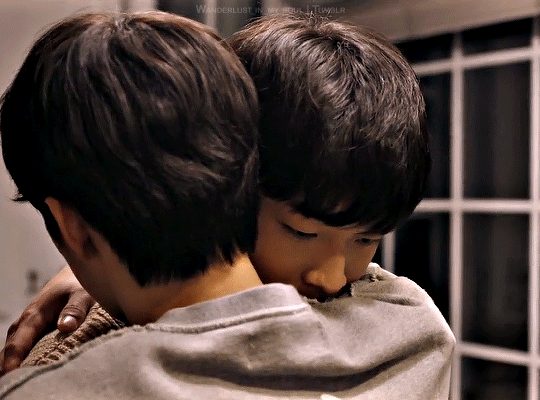





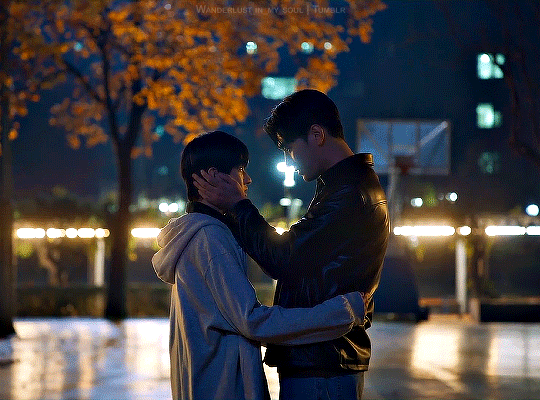


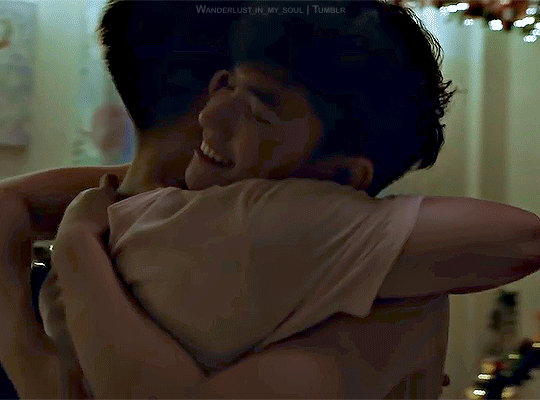
“It was an intense embrace, no awkwardness, no holding back, the kind of hug two people can only achieve after long intimacy, but anyone can give in an instant to a stuffed bear.” ― Ada Palmer, Seven Surrenders
To My Star 2
A Boss And A Babe
Minato Shouji Coin Laundry
You're My Sky
My School President
Don't Say No
Semantic Error
The New Employee
History 2: Crossing The Line
Gaya Sa Pelikula / Like In The Movies
Favorite hugs (Part 3/?) as part of my favorite bl-tropes collection, as always in no particular order.
#multi bl#multibl.edit#hugsthatIlove#bl tropes#bl series#bl drama#to my star 2#a boss and a babe#minato shouji coin laundry#you're my sky#my school president#don't say no#semantic error#the new employee#history 2: crossing the line#gaya sa pelikula#like in the movies#myedit#hug#because I need a hug today
409 notes
·
View notes